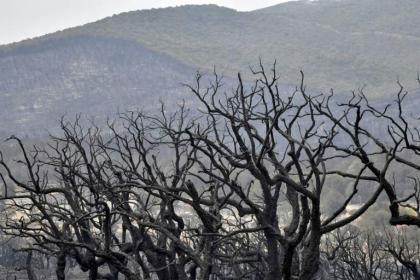More than 10 percent of a UNESCO-listed biosphere reserve has been destroyed by fires that tore through northeastern Algeria, killing at least 38 people, an expert told AFP on Saturday.
The figure cited by Rafik Baba Ahmed, former director of the El Kala Biosphere Reserve, means that the burned area of the park alone is almost double what the civil defence service said has been destroyed throughout Africa’s largest country since June.
Algeria’s northeast was particularly hard-hit since Wednesday by blazes exacerbated by climate change, but the fire service on Saturday said most of the fires there had been put out.
“The Wednesday fires damaged around 10,000 hectares (24,700 acres)” of the park, Baba Ahmed said.
According to the United Nations cultural agency UNESCO, El Kala Biosphere Reserve covers more than 76,000 hectares.
It is the last refuge of the Barbary Red Deer and “home to a very remarkable bird life, more than 60,000 migratory birds every winter”, UNESCO’s website says.
“It is (a) mosaic of marine, dune, lake and forest ecosystems, with its marine strip rich in corals, Posidonia meadows and fish,” UNESCO says.
According to Baba Ahmed, forest covers 54,000 hectares of the park and most of the trees are cork oak.
“It is considered one of the main biodiversity re-serves in the Mediterranean basin,” he said, extolling its “exceptional biological richness”.
But Baba Ahmed said he was “very pessimistic” about the future of the area regularly damaged by forest fires.
“Over time the fires weaken the forest, making it vulnerable to other attacks: harmful insects but es-pecially to human activities.” As a consequence, the area loses its flora and fauna, the forestry expert added.
Civil Defence Colonel Boualem Boughlef said on television Friday night that since June 1, 1,242 fires had destroyed 5,345 hectares of woodlands in Alge-ria.
Baba Ahmed said that figure is not realistic. While Algeria’s northeastern fires have been largely extinguished, firefighters fought two blazes on the other side of the country in Tlemcen, in the far west, the civil defence said Saturday on its Facebook page.
The fires led Algerians both at home and in the diaspora to collect clothing, medicines and food to help those affected.—APP










